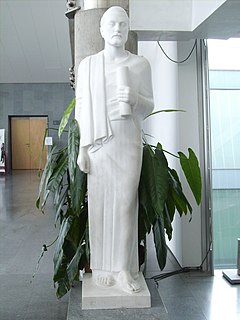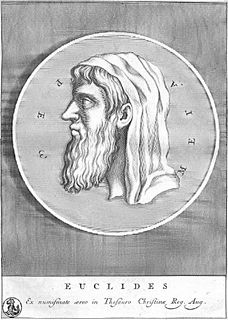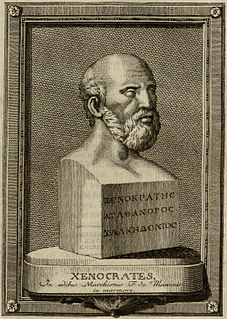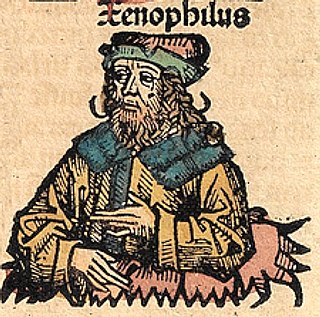 W
WAnaxarchus was a Greek philosopher of the school of Democritus. Together with Pyrrho, he accompanied Alexander the Great into Asia. The reports of his philosophical views suggest that he was a forerunner of Pyrrhonism. Aelian writes that he was called Eudaemonicus or "Happy Man"(Ancient Greek: Εὐδαιμονικὸς).
 W
WAntisthenes was a Greek philosopher and a pupil of Socrates. Antisthenes first learned rhetoric under Gorgias before becoming an ardent disciple of Socrates. He adopted and developed the ethical side of Socrates' teachings, advocating an ascetic life lived in accordance with virtue. Later writers regarded him as the founder of Cynic philosophy.
 W
WArchytas was an Ancient Greek philosopher, mathematician, astronomer, statesman, and strategist. He was a scientist of the Pythagorean school and famous for being the reputed founder of mathematical mechanics, as well as a good friend of Plato.
 W
WAristippus of Cyrene was the founder of the Cyrenaic school of Philosophy. He was a pupil of Socrates, but adopted a very different philosophical outlook, teaching that the goal of life was to seek pleasure by circumstances to oneself and by maintaining proper control over both adversity and prosperity. His outlook came to be called "ethical hedonism." Among his pupils was his daughter Arete.
 W
WAristotle was a Greek philosopher and polymath during the Classical period in Ancient Greece. Taught by Plato, he was the founder of the Lyceum, the Peripatetic school of philosophy, and the Aristotelian tradition. His writings cover many subjects including physics, biology, zoology, metaphysics, logic, ethics, aesthetics, poetry, theatre, music, rhetoric, psychology, linguistics, economics, politics, and government. Aristotle provided a complex synthesis of the various philosophies existing prior to him. It was above all from his teachings that the West inherited its intellectual lexicon, as well as problems and methods of inquiry. As a result, his philosophy has exerted a unique influence on almost every form of knowledge in the West and it continues to be a subject of contemporary philosophical discussion.
 W
WAristoxenus of Tarentum was a Greek Peripatetic philosopher, and a pupil of Aristotle. Most of his writings, which dealt with philosophy, ethics and music, have been lost, but one musical treatise, Elements of Harmony, survives incomplete, as well as some fragments concerning rhythm and meter. The Elements is the chief source of our knowledge of ancient Greek music.
 W
WCrates of Thebes was a Cynic philosopher. Crates gave away his money to live a life of poverty on the streets of Athens. He married Hipparchia of Maroneia who lived in the same manner that he did. Respected by the people of Athens, he is remembered for being the teacher of Zeno of Citium, the founder of Stoicism. Various fragments of Crates' teachings survive, including his description of the ideal Cynic state.
 W
WDemetrius of Phalerum was an Athenian orator originally from Phalerum, a student of Theophrastus, and perhaps of Aristotle, and one of the first Peripatetics. Demetrius was a distinguished statesman who was appointed by the Macedonian king, Cassander, to govern Athens, where he ruled as sole ruler for ten years, introducing important reforms of the legal system while maintaining pro-Cassander oligarchic rule. He was exiled by his enemies in 307 BC, and he went first to Thebes, and then, after 297 BC, to the court of Alexandria. He wrote extensively on the subjects of history, rhetoric, and literary criticism. He is not to be confused with his grandson, also called Demetrius of Phaleron, who probably served as regent of Athens between 262 and 255, on behalf of the Macedonian King Antigonos Gonatas.
 W
WDicaearchus of Messana, also written Dicearchus or Dicearch, was a Greek philosopher, cartographer, geographer, mathematician and author. Dicaearchus was Aristotle's student in the Lyceum. Very little of his work remains extant. He wrote on the history and geography of Greece, of which his most important work was his Life of Greece. He made important contributions to the field of cartography, where he was among the first to use geographical coordinates. He also wrote books on philosophy and politics.
 W
WDiogenes, also known as Diogenes the Cynic, was a Greek philosopher and one of the founders of Cynic philosophy. He was born in Sinope, an Ionian colony on the Black Sea coast of modern day Turkey, in 412 or 404 BC and died at Corinth in 323 BC.
 W
WEpicurus was an ancient Greek philosopher and sage who founded Epicureanism, a highly influential school of philosophy. He was born on the Greek island of Samos to Athenian parents. Influenced by Democritus, Aristippus, Pyrrho, and possibly the Cynics, he turned against the Platonism of his day and established his own school, known as "the Garden", in Athens. Epicurus and his followers were known for eating simple meals and discussing a wide range of philosophical subjects. He openly allowed women to join the school as a matter of policy. Epicurus is said to have originally written over 300 works on various subjects, but the vast majority of these writings have been lost. Only three letters written by him—the letters to Menoeceus, Pythocles, and Herodotus—and two collections of quotes—the Principal Doctrines and the Vatican Sayings—have survived intact, along with a few fragments of his other writings. Most knowledge of his teachings comes from later authors, particularly the biographer Diogenes Laërtius, the Epicurean Roman poet Lucretius and the Epicurean philosopher Philodemus, and with hostile but largely accurate accounts by the Pyrrhonist philosopher Sextus Empiricus, and the Academic Skeptic and statesman Cicero.
 W
WEuclid of Megara was a Greek Socratic philosopher who founded the Megarian school of philosophy. He was a pupil of Socrates in the late 5th century BC, and was present at his death. He held the supreme good to be one, eternal and unchangeable, and denied the existence of anything contrary to the good. Editors and translators in the Middle Ages often confused him with Euclid of Alexandria when discussing the latter's Elements.
 W
WHipparchia of Maroneia was a Cynic philosopher, and wife of Crates of Thebes. She was the sister of Metrokles, the cynic philosopher. She was born in Maroneia, but her family moved to Athens, where Hipparchia came into contact with Crates, the most famous Cynic philosopher in Greece at that time. She fell in love with him, and, despite the disapproval of her parents, she married him. She went on to live a life of Cynic poverty on the streets of Athens with her husband.
 W
WLi Kui was a Chinese hydraulic engineer, philosopher, and politician. He served as government minister and court advisor to Marquis Wen in the state of Wei. In 407 BC, he wrote the Book of Law, which was the basis for the codified laws of the Qin and Han dynasties.
 W
WLie Yukou is considered the author of the Daoist book Liezi, which uses his honorific name Liezi.
 W
WMencius ; born Mèng kē ; or Mengzi was a Chinese Confucian philosopher who has often been described as the "second Sage", that is, after only Confucius himself. He is part of Confucius's fourth generation of disciples. Mencius inherited Confucius's thinking and developed it further. Living during the Warring States period, he is said to have spent much of his life travelling around China offering counsel to different rulers. Conversations with these rulers form the basis of the Mencius, which would later be canonised as a Confucian classic.
 W
WMonimus of Syracuse, was a Cynic philosopher who endorsed philosophical skepticism, denying that there was a criterion of truth.
 W
WOnesicritus, a Greek historical writer and Cynic philosopher, who accompanied Alexander the Great on his campaigns in Asia. He claimed to have been the commander of Alexander's fleet but was actually only a helmsman; Arrian and Nearchus often criticize him for this. When he returned home, he wrote a history of Alexander's campaigns. He is frequently cited by later authors, who also criticize him for his inaccuracies.
 W
WPlato was an Athenian philosopher during the Classical period in Ancient Greece, founder of the Platonist school of thought, and the Academy, the first institution of higher learning in the Western world.
 W
WPyrrho of Elis was a Greek philosopher of Classical antiquity and is credited as being the first Greek skeptic philosopher and founder of Pyrrhonism.
 W
WShang Yang, also known as Wei Yang and originally surnamed Gongsun, was an ancient Chinese philosopher, politician and a prominent legalist scholar. Born in the Zhou vassal state of Wey during the Warring States period, he was a statesman, chancellor and reformer serving the State of Qin, where his policies laid the administrative, political and economic foundations that strengthened the Qin state and would eventually enable Qin to conquer the other six rival states, unifying China into a centralized rule for the first time in history under the Qin dynasty. He and his followers contributed to the Book of Lord Shang, a foundational philosophical work for the school of Chinese legalism.
 W
WSpeusippus was an ancient Greek philosopher. Speusippus was Plato's nephew by his sister Potone. After Plato's death, c.348 BC, Speusippus inherited the Academy, near age 60, and remained its head for the next eight years. However, following a stroke, he passed the chair to Xenocrates. Although the successor to Plato in the Academy, Speusippus frequently diverged from Plato's teachings. He rejected Plato's Theory of Forms, and whereas Plato had identified the Good with the ultimate principle, Speusippus maintained that the Good was merely secondary. He also argued that it is impossible to have satisfactory knowledge of any thing without knowing all the differences by which it is separated from everything else.
 W
WStilpo was a Greek philosopher of the Megarian school. He was a contemporary of Theophrastus, Diodorus Cronus, and Crates of Thebes. None of his writings survive, he was interested in logic and dialectic, and he argued that the universal is fundamentally separated from the individual and concrete. His ethical teachings approached that of the Cynics and Stoics. His most important followers were Pyrrho, the founder of Pyrrhonism, and Zeno of Citium, the founder of Stoicism.
 W
WTheophrastus, a Greek native of Eresos in Lesbos, was the successor to Aristotle in the Peripatetic school. His given name was Tyrtamus (Τύρταμος); his nickname Θεόφραστος was given by Aristotle for his 'divine style of expression'.
 W
WWu Qi was a Chinese military leader, Legalist philosopher, and politician in the Warring States period.
 W
WXenocrates of Chalcedon was a Greek philosopher, mathematician, and leader (scholarch) of the Platonic Academy from 339/8 to 314/3 BC. His teachings followed those of Plato, which he attempted to define more closely, often with mathematical elements. He was also an avid student of the council of the thirty-three. He distinguished three forms of being: the sensible, the intelligible, and a third compounded of the two, to which correspond respectively, sense, intellect and opinion. He considered unity and duality to be gods which rule the universe, and the soul a self-moving number. God pervades all things, and there are daemonical powers, intermediate between the divine and the mortal, which consist in conditions of the soul. He held that mathematical objects and the Platonic Ideas are identical, unlike Plato who distinguished them. In ethics, he taught that virtue produces happiness, but external goods can minister to it and enable it to effect its purpose.
 W
WXenophilus, of Chalcidice, was a Pythagorean philosopher and musician who lived in the first half of the 4th century BC. Aulus Gellius relates that Xenophilus was the intimate friend and teacher of Aristoxenus and implies that Xenophilus taught him Pythagorean doctrine. He was said to have belonged to the last generation of Pythagoreans, and he is the only Pythagorean known to have lived in Athens in the 4th century BC.
 W
WZhuang Zhou, commonly known as Zhuangzi, was an influential Chinese philosopher who lived around the 4th century BC during the Warring States period, a period corresponding to the summit of Chinese philosophy, the Hundred Schools of Thought. He is credited with writing—in part or in whole—a work known by his name, the Zhuangzi, which is one of the foundational texts of Taoism.